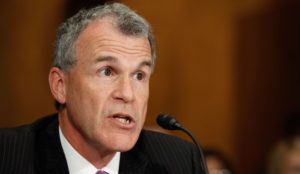Former CIA top dog Robert Grenier: We should hunt down pro-Trump Americans as we hunted down al-Qaeda members
BY ROBERT SPENCER
republished below in full unedited for informational, educational & research purposes:
“Yes. And that is that, you know, even at the seeming height of the crisis immediately after 9/11, there really weren’t that many members of al-Qaida in Afghanistan. And the thrust of our campaign there was, yes, to hunt down al-Qaida, but primarily to remove the supportive environment in which they were able to live and to flourish.”
That means Grenier doesn’t just want to destroy Trump (as he explains in the section not reproduced below) and hunt down those who actually committed crimes at the Capitol. He wants to crush legitimate political dissent and hunt down Americans who oppose the far-Left agenda as if they were terrorists. This has been a long time coming. But only now is it being repeated at the highest levels by people with power and influence.
“Former CIA Officer: Treat Domestic Extremism As An Insurgency,” by Mary Louise Kelly, NPR, February 2, 2021:
When it comes to domestic extremists such as those who stormed the Capitol, a longtime CIA officer argues that the U.S. should treat them as an insurgency.
That means using counterinsurgency tactics — similar in some ways to those used in the wars in Afghanistan and Iraq.
Robert Grenier served as the CIA’s station chief for Pakistan and Afghanistan in 2001. He went on to become the CIA’s Iraq mission manager and then director of the CIA Counterterrorism Center from 2004 to 2006.
“We may be witnessing the dawn of a sustained wave of violent insurgency within our own country, perpetrated by our own countrymen,” Grenier wrote in The New York Times last week. And without national action, he argues, “extremists who seek a social apocalypse … are capable of producing endemic political violence of a sort not seen in this country since Reconstruction.”
In an interview with All Things Considered, Grenier discusses what that national action would mean.
As someone who has watched many violent insurgencies unfold in various countries around the world, what felt the same to you? What felt different?
I don’t want to be one to suggest that somehow the United States is going to in any way resemble Iraq or Afghanistan at the height of violence. But what I think is useful is to have some way of thinking about the problem and thinking through the elements of the solution. So I think as in any insurgency situation, you have committed insurgents who are typically a relatively small proportion of the affected population. But what enables them to carry forward their program is a large number of people from whom they can draw tacit support. And that’s what I’m primarily concerned with here. I think what is most important is that we drive a wedge between those violent individuals and the people who may otherwise see them as reflecting their interests and fighting on their behalf….
You were station chief in Islamabad on 9/11, which meant it suddenly became your problem to find and kill or capture Osama bin Laden and other senior al-Qaida leaders. Without comparing American citizens to al-Qaida, are there lessons that you take from that?
Yes. And that is that, you know, even at the seeming height of the crisis immediately after 9/11, there really weren’t that many members of al-Qaida in Afghanistan. And the thrust of our campaign there was, yes, to hunt down al-Qaida, but primarily to remove the supportive environment in which they were able to live and to flourish. And that meant fighting the Taliban. And I think that is the heart of what we need to deal with here. Hunting down people who are criminals, that is something that which U.S. law enforcement is very well capable of doing and doing while preserving fundamental civil rights. That’s in some ways the easiest part of the problem. The difficult part of the problem is affecting the environment within which violent elements otherwise would be able to thrive.

